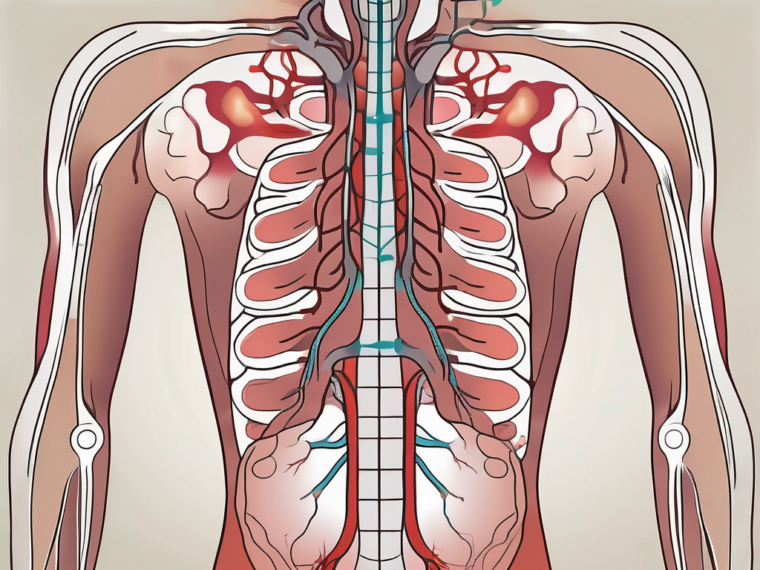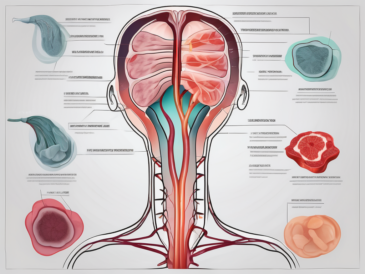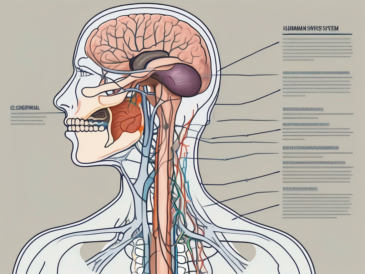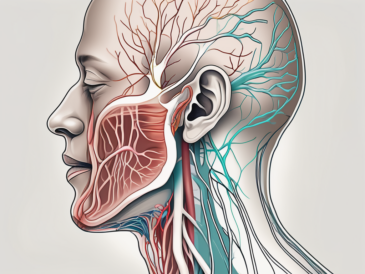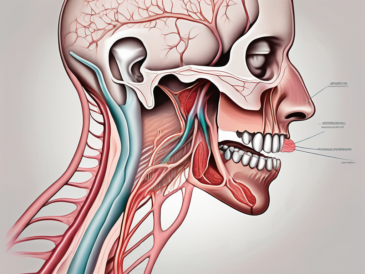The glossopharyngeal nerve, also known as cranial nerve IX, is one of the twelve cranial nerves that emerge directly from the brain. It plays a crucial role in the functioning of the parasympathetic nervous system. Understanding the anatomy, role, and disorders related to the glossopharyngeal nerve is essential in comprehending its contribution to parasympathetic function, which we will delve into in this article.
Understanding the Glossopharyngeal Nerve
The glossopharyngeal nerve is a crucial component of the nervous system, playing a significant role in sensory perception and regulating various bodily functions. Let’s dive deeper into the anatomy and functions of this fascinating nerve.
Anatomy of the Glossopharyngeal Nerve
The glossopharyngeal nerve, also known as cranial nerve IX, originates from the medulla oblongata, which is located in the lower part of the brainstem. Emerging from its origin, this nerve extends downwards and splits into two branches – the tympanic and pharyngeal branches.
The tympanic branch of the glossopharyngeal nerve traverses through the middle ear, providing sensory innervation to the mucous membranes, eardrum, and middle ear structures involved in hearing and balance. This branch allows us to perceive sound and maintain our sense of equilibrium, contributing to our overall auditory experience.
In addition to its role in hearing, the glossopharyngeal nerve carries taste sensations from the posterior one-third of the tongue through its lingual branch. This branch is responsible for relaying information about the flavors we experience, adding richness and complexity to our gustatory perception.
Role and Functions of the Glossopharyngeal Nerve
The glossopharyngeal nerve primarily functions as a sensory pathway, transmitting vital information from the tongue and pharynx to the brain. This information is crucial for taste perception, allowing us to savor the diverse flavors of the foods we consume.
Furthermore, the glossopharyngeal nerve plays a vital role in swallowing and gag reflexes. It provides sensory input that triggers the coordinated movements of the muscles involved in these processes, ensuring the safe passage of food and protecting the airway from potential harm.
But the functions of the glossopharyngeal nerve extend beyond taste and swallowing. This nerve also monitors blood pressure through its carotid sinus branch. The carotid sinus is a specialized area in the carotid artery that detects changes in blood pressure. The glossopharyngeal nerve relays this information to the brain, allowing for appropriate adjustments to maintain cardiovascular homeostasis.
Additionally, the glossopharyngeal nerve regulates blood gas levels through its carotid body branch. The carotid body is a small cluster of chemoreceptor cells located near the carotid artery. It senses changes in oxygen and carbon dioxide levels in the blood and sends signals via the glossopharyngeal nerve to adjust breathing rates and ensure adequate oxygenation.
Moreover, the glossopharyngeal nerve acts as a conduit for parasympathetic fibers that regulate various bodily functions. As part of the parasympathetic system, it is responsible for facilitating the body’s involuntary, restful activities, often known as “rest-and-digest” responses. These include promoting digestion, regulating heart rate, and maintaining optimal glandular secretions.
In conclusion, the glossopharyngeal nerve is a remarkable component of our nervous system, contributing to our sensory experiences, regulating vital functions, and ensuring overall well-being. Its intricate anatomy and multifaceted functions make it an essential player in our daily lives.
The Parasympathetic Nervous System Explained
The parasympathetic nervous system is a crucial component of the autonomic nervous system, which controls involuntary bodily functions. It works in harmony with the sympathetic nervous system to maintain homeostasis and regulate vital bodily functions. While the sympathetic nervous system prepares the body for fight or flight responses during stressful situations, the parasympathetic system primarily operates during non-stressful situations and aids in conserving and restoring energy levels.
Through its widespread network of nerves, the parasympathetic system controls various physiological processes, ensuring the smooth functioning of the body. One of its key roles is regulating heart rate, ensuring that it remains within a healthy range. By slowing down the heart rate and reducing blood pressure, the parasympathetic system helps maintain a calm state and promotes relaxation.
In addition to regulating heart rate, the parasympathetic system plays a vital role in digestion. It stimulates the flow of digestive enzymes, increases gastric secretions, and enhances nutrient absorption. This ensures that the body can efficiently break down food and extract essential nutrients for energy and overall well-being. Furthermore, the parasympathetic system promotes salivation, which aids in the initial stages of digestion, and constricts bronchial airways, facilitating smooth breathing.
Another important function of the parasympathetic system is its involvement in the urinary system. It promotes urination and helps maintain healthy bladder function. By relaxing the muscles of the bladder, the parasympathetic system allows for the efficient elimination of waste products from the body.
Overall, the parasympathetic nervous system plays a crucial role in maintaining the body’s internal balance and ensuring optimal functioning of various organs. Its activation promotes relaxation, stimulates digestion, and helps maintain healthy bladder function. Without the parasympathetic system, our bodies would struggle to perform these essential functions, leading to various health complications.
The Connection Between the Glossopharyngeal Nerve and Parasympathetic Function
The glossopharyngeal nerve plays a crucial role in the regulation of parasympathetic function. This nerve, also known as cranial nerve IX, is responsible for transmitting parasympathetic fibers to specific target organs in the body. By doing so, it influences various physiological processes and helps maintain overall homeostasis.
How the Glossopharyngeal Nerve Influences Parasympathetic Activity
One of the key functions of the glossopharyngeal nerve is its contribution to the stimulation of the parotid salivary gland. This gland is responsible for producing saliva, which is essential for the initial stages of digestion. The glossopharyngeal nerve carries parasympathetic fibers to the parotid salivary gland, triggering the release of saliva and facilitating the breakdown of food.
In addition to its role in salivation, the glossopharyngeal nerve’s parasympathetic component also connects with the carotid sinus. The carotid sinus is a specialized area located within the carotid artery, a vital blood vessel that supplies blood to the brain. By relaying sensory information from the carotid sinus to the brain, the glossopharyngeal nerve assists in the regulation of blood pressure.
When the carotid sinus detects changes in blood pressure, it sends signals to the brain via the glossopharyngeal nerve. These signals prompt the brain to initiate appropriate responses to maintain optimal blood pressure levels. This feedback loop between the glossopharyngeal nerve and the carotid sinus helps ensure that blood pressure remains within a healthy range.
The Glossopharyngeal Nerve’s Impact on Parasympathetic Responses
When the glossopharyngeal nerve is functioning optimally, it supports efficient parasympathetic responses throughout the body. The parasympathetic nervous system is responsible for promoting rest, relaxation, and digestion. It counteracts the effects of the sympathetic nervous system, which is responsible for the body’s “fight or flight” response.
However, certain disorders affecting the glossopharyngeal nerve can disrupt parasympathetic activity and lead to various health complications. For example, glossopharyngeal neuralgia is a condition characterized by severe pain in the throat, tongue, and ear, which can be triggered by activities such as swallowing or speaking. This condition can interfere with the normal functioning of the glossopharyngeal nerve and subsequently affect parasympathetic responses.
Furthermore, damage to the glossopharyngeal nerve can result from trauma, infections, or underlying medical conditions. This damage can lead to a range of symptoms, including difficulty swallowing, loss of taste sensation, and impaired salivation. These symptoms can significantly impact parasympathetic function and overall quality of life.
In conclusion, the glossopharyngeal nerve plays a vital role in influencing parasympathetic activity. Its connections with the parotid salivary gland and the carotid sinus contribute to the regulation of salivation and blood pressure, respectively. Understanding the connection between the glossopharyngeal nerve and parasympathetic function is essential for comprehending the intricate workings of the human body and diagnosing and treating related disorders.
Disorders Related to the Glossopharyngeal Nerve and Parasympathetic Function
The glossopharyngeal nerve, also known as cranial nerve IX, plays a crucial role in various functions related to the throat, tongue, and ear. When this nerve is affected by disorders, it can lead to a range of symptoms and complications that significantly impact an individual’s quality of life.
Common Disorders of the Glossopharyngeal Nerve
One common disorder related to the glossopharyngeal nerve is glossopharyngeal neuralgia. This condition is characterized by intense shooting pain in the throat, tongue, ear, or tonsil area. The pain can be triggered by various factors, such as swallowing, speaking, or even just touching the affected areas. Glossopharyngeal neuralgia can be extremely debilitating, making it difficult for individuals to carry out their daily activities. Seeking medical evaluation is crucial for an accurate diagnosis and effective management of this condition.
Another disorder that can affect the glossopharyngeal nerve is glossopharyngeal neuropathy. This condition is characterized by impaired sensation in the throat, tongue, or ear. It can result from nerve compression or trauma, leading to symptoms such as numbness, tingling, or a sensation of “pins and needles” in the affected areas. Glossopharyngeal neuropathy can significantly impact an individual’s ability to swallow, taste, and hear properly. Seeking prompt medical advice for evaluation and guidance is essential in order to address the underlying cause and manage the symptoms effectively.
How Parasympathetic Function is Affected by Glossopharyngeal Nerve Disorders
The glossopharyngeal nerve plays a vital role in regulating parasympathetic function, which is responsible for various automatic processes in the body. When disorders affect the glossopharyngeal nerve, they can disrupt the normal functioning of the parasympathetic system, leading to a range of complications.
For example, glossopharyngeal neuropathy can result in difficulties in swallowing, also known as dysphagia. This can make it challenging for individuals to eat and drink properly, leading to inadequate nutrition and potential weight loss. In addition, glossopharyngeal neuropathy can alter taste perception, causing a distorted or diminished sense of taste. This can affect an individual’s enjoyment of food and may lead to a decreased appetite.
Furthermore, glossopharyngeal neuropathy can compromise salivation, leading to a condition known as xerostomia or dry mouth. Saliva plays a crucial role in oral health, aiding in digestion, and preventing tooth decay. When salivation is reduced, individuals may experience difficulties in speaking, swallowing, and maintaining good oral hygiene.
Research into the association between glossopharyngeal nerve disorders and parasympathetic dysfunction is ongoing. It is important for individuals experiencing symptoms related to the glossopharyngeal nerve to seek medical consultation for accurate diagnosis and appropriate management. Treatment options may include medication to alleviate pain, physical therapy to improve swallowing function, and lifestyle modifications to address the underlying causes of the disorders.
Treatment and Management of Glossopharyngeal Nerve Disorders
The glossopharyngeal nerve is a vital component of the cranial nerves responsible for various functions, including taste sensation, swallowing, and parasympathetic innervation. When disorders affecting the glossopharyngeal nerve arise, it is crucial to explore treatment options that can alleviate symptoms and improve overall quality of life.
Modern Treatment Approaches
Advancements in medical and surgical interventions have provided various treatment options for glossopharyngeal nerve disorders. Medications, such as anticonvulsants and nerve pain medications, are commonly prescribed to alleviate symptoms associated with glossopharyngeal neuralgia.
Anticonvulsants, such as gabapentin or carbamazepine, work by stabilizing the electrical activity in the nerves, reducing the occurrence and severity of pain episodes. Nerve pain medications, like amitriptyline or pregabalin, target the specific pathways involved in transmitting pain signals, providing relief to individuals experiencing glossopharyngeal nerve-related pain.
In cases where medical management is not effective, surgical approaches may be considered. Microvascular decompression, a surgical procedure where a small cushion is placed between the glossopharyngeal nerve and the blood vessel causing compression, can alleviate symptoms and restore normal nerve function. Nerve block injections, such as local anesthetics or corticosteroids, can also provide temporary relief by blocking pain signals from reaching the brain.
However, each treatment option should be discussed thoroughly with a healthcare professional to determine its potential benefits and risks. Factors such as the severity of symptoms, underlying causes, and individual health considerations should be taken into account when deciding on the most appropriate treatment approach.
Future Perspectives in Managing Glossopharyngeal Nerve Disorders
As medical research continues to unfold, further insights into the nuances of glossopharyngeal nerve disorders and their impact on parasympathetic function are anticipated. This ongoing progress holds promise for the development of more targeted and effective treatment strategies.
Researchers are exploring innovative techniques, such as neuromodulation, which involves the use of electrical or magnetic stimulation to modulate nerve activity. This approach shows potential in providing long-term relief for individuals with glossopharyngeal nerve disorders by altering the abnormal nerve signals responsible for pain or dysfunction.
Additionally, advancements in imaging technology, such as magnetic resonance imaging (MRI) and functional MRI (fMRI), allow for better visualization and understanding of the glossopharyngeal nerve’s anatomy and its intricate connections within the parasympathetic system. This knowledge can aid in the development of more precise and targeted treatment approaches.
In conclusion, the glossopharyngeal nerve plays a crucial role in contributing to parasympathetic function. Understanding its anatomy, role, connections to the parasympathetic system, and associated disorders is essential for both healthcare professionals and individuals seeking insights into the relationship between the glossopharyngeal nerve and parasympathetic activity.
If experiencing any symptoms or concerns related to the glossopharyngeal nerve’s function, it is always recommended to consult with a medical professional for expert evaluation and guidance. With the advancements in treatment options and ongoing research, individuals affected by glossopharyngeal nerve disorders can find hope in the pursuit of improved management and a better quality of life.
